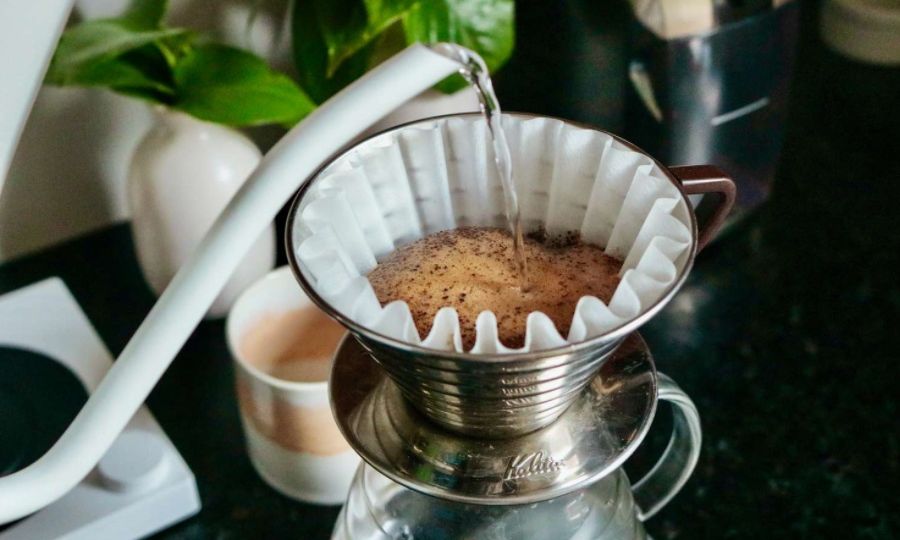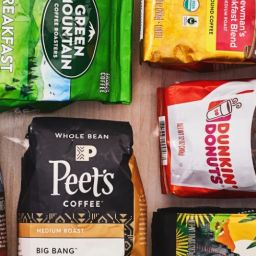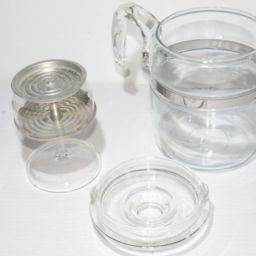
Water, often overlooked, is the unsung hero of coffee brewing. Making up more than 98% of your cup of java, the quality of water you use is pivotal. It’s not just about quenching thirst or filling up the pot; it’s about extracting the very essence of those carefully chosen beans. The right water brings out the flavors, aromas, and nuances, turning a simple beverage into an experience.
Key Takeaways
- Aim for pH Neutral: The sweet spot for brewing water is a pH level between 6.5 and 7.5. This balance ensures that the water neither dulls the coffee’s natural flavors nor adds any unwanted acidity.
- Say No to Distilled and RO Water: Though it might seem counterintuitive, distilled or Reverse Osmosis water isn’t your friend here. Their lack of minerals, crucial for extracting coffee’s flavor, can also harm your brewing equipment over time.
- Filtered Water is Your Best Bet: By removing undesirables but keeping those flavor-enhancing minerals, filtered water offers a Goldilocks solution for your brew.
- Minerals Matter: Specifically, magnesium and calcium. Magnesium pulls out sharp and fruity flavors, while calcium leans towards the creamy and rich. Together, they’re a dynamic duo in flavor extraction.
- Soft vs. Hard Water: Generally, softer water, which is lower in mineral content, is preferable for that perfect cup. It enhances the coffee’s natural profile without overpowering it.
The Science of Water and Coffee
Dive into any cup of coffee, and you’re diving into a world where chemistry reigns supreme. Water isn’t just H₂O when it comes to coffee brewing; it’s a solvent, the medium through which the flavors and oils in coffee beans transfer to your cup. The mineral content and pH level of water play critical roles in this flavorful journey.
Minerals like magnesium and calcium aren’t just filler; they’re flavor enhancers. Magnesium is like the life of the party, grabbing onto those sharp, fruity flavors and ensuring they shine in your final brew. Calcium, on the other hand, prefers the rich and creamy notes, giving your coffee a fuller body. Then there’s pH level—a measure of how acidic or basic water is. Water that’s too acidic or too basic can make your coffee taste off. The ideal pH for coffee water? That’s a neutral playground, between 6.5 and 7.5, where all flavors get to play nicely.
Types of Water to Use for Coffee
Let’s break down the contenders: distilled, Reverse Osmosis (RO), purified, and tap water. Each has its own quirks and features, impacting your beloved brew in different ways.
- Distilled Water: It’s like a blank canvas, stripped of minerals and impurities. Great for experiments in chemistry class, but not so much for coffee. Without minerals, distilled water can’t extract those delicious coffee flavors effectively. Plus, it might just go after your coffee machine’s minerals, leading to wear and tear.
- Reverse Osmosis (RO) Water: RO water goes through a tight filtration process, coming out clean and pure. While it sounds ideal, like distilled water, it lacks the minerals needed for the perfect coffee extraction. You can tweak RO water by adding minerals back, but that’s an extra step for your morning routine.
- Purified Water: This is your middle ground. Purified through filtration or other methods, it removes the bad stuff while keeping the good minerals. It’s like filtered water’s cousin, often found in bottled form, and a safe bet for a tasty cup.
- Tap Water: The most accessible, yet the most variable. Depending on where you live, tap water can range from hard (full of minerals) to soft (not so much). While hard water can enhance flavor due to its mineral content, it can also lead to limescale buildup in your machine. Soft water, lacking in minerals, might fall flat on flavor extraction but is kinder to your equipment.
Filtered Water: The Optimal Choice
When it comes to brewing the perfect cup of coffee, filtered water sits on the throne. Why? Because it masterfully balances the act of keeping essential minerals while saying goodbye to impurities. Imagine water as a canvas for your coffee; you want it clean yet textured enough to bring out the vibrant flavors of the coffee beans.
Filtered water does just that. It goes through a process that removes chlorine, odors, and any off-tasting elements without stripping away the beneficial minerals like calcium and magnesium that play pivotal roles in flavor extraction. This careful removal and retention mean that each sip of coffee is not just a drink but a symphony of flavors, perfectly balanced and harmonious.
The Role of Minerals in Brewing
Diving deeper into the mineral content, let’s spotlight calcium and magnesium – the unsung heroes in your water that significantly influence your coffee’s taste profile.
- Magnesium: Think of magnesium as the flavor enhancer, the secret ingredient that pulls out the complex, sharp, and fruitier notes from your coffee beans. It’s the friend who brings out the best in everyone, ensuring those subtle flavors don’t go unnoticed in your cup. Magnesium-rich water manages to extract more of these flavors, making your coffee richer and more vibrant.
- Calcium: On the other hand, calcium plays a different but equally important role. It leans towards emphasizing the heavier, creamy notes, adding a certain depth and body to the coffee. It’s like the bass in a piece of music, providing a foundation on which the other flavors can dance. However, it’s all about balance. Too much calcium, and you risk your coffee becoming too heavy or even causing scale build-up in your coffee machine.
The interplay between these minerals is a delicate dance that filtered water manages to orchestrate perfectly. By maintaining the right levels of calcium and magnesium, filtered water ensures that every cup of coffee is not just a beverage but an experience. It’s about finding harmony between eliminating what you don’t want in your water and keeping what you do, setting the stage for coffee that’s as good as it can possibly be.
Home Filtration Options
For the home barista, achieving the perfect cup of coffee begins with the right water. Thankfully, there are several filtration options available to ensure your brewing water is just right.
- Pitcher Filters: These are perhaps the most accessible and user-friendly option for home use. A pitcher filter typically uses activated carbon to reduce chlorine, odors, and other contaminants from tap water. While simple and cost-effective, they require regular filter changes to maintain their effectiveness. The result? Cleaner water that can dramatically improve your coffee’s taste by removing the flavors that you don’t want in your cup.
- Faucet-Mounted Filters: As the name suggests, these filters attach directly to your faucet, providing filtered water on demand. They’re a step up in convenience and often in filtration capability, compared to pitcher filters. By removing a broad spectrum of contaminants, including certain minerals, they can offer a significant improvement in the taste of your coffee, ensuring that the water contributes positively to the brew.
- Water Softeners: For those in areas with hard water, a water softener can be a game-changer. Hard water, rich in minerals like calcium and magnesium, can lead to scale buildup in coffee machines and affect the taste of coffee. Water softeners use an ion exchange process to reduce these minerals, potentially improving both the longevity of your brewing equipment and the consistency of your coffee flavor.
Commercial Filtration Systems
On the commercial side, coffee shops, especially chains like Starbucks, take water filtration seriously to ensure that every cup of coffee tastes consistent, no matter where you are in the world. These businesses use sophisticated water filtration systems designed to rigorously control the water’s mineral content, pH level, and purity.
Starbucks, for instance, has set meticulous standards for its water quality, employing advanced filtration systems in each store. These systems are tailored to the specific needs of the location, considering the local water supply’s unique characteristics.
The goal? To achieve the optimal balance of minerals and purity, ensuring that the water enhances the coffee’s flavor rather than detracting from it. This level of attention to water quality is a key factor in the brand’s ability to deliver a consistent and high-quality coffee experience across the globe.
FAQs
Can I use tap water for brewing coffee?
Yes, you can, but its quality varies widely depending on your location. Tap water with a balanced mineral content and without noticeable chlorine or other impurities can make a good cup of coffee. However, if your tap water is hard or has a strong taste or odor, you might want to filter it first.
Is distilled water a good choice for coffee?
No, distilled water is not recommended for brewing coffee. It lacks minerals that are essential for extracting the full flavor from coffee beans. Additionally, using distilled water can harm your coffee equipment by leaching minerals from it.
What’s the deal with mineral water and coffee?
Mineral water can enhance your coffee’s flavor due to its magnesium and calcium content. However, too much mineral content can lead to scale build-up in your coffee maker. Aim for balanced mineral water or filtered water for the best results.
Final Thoughts
Choosing the right water is as crucial to your coffee as the beans you select. Filtered water stands out as the optimal choice for most home brewers, striking the perfect balance between removing impurities and retaining the essential minerals that coffee flavors thrive on. Remember, the goal is clean, clear, fresh water with a neutral pH and a Total Dissolved Solids (TDS) level that supports, not overpowers, the coffee extraction process.
Avoid distilled and RO water for your daily brew to protect both your coffee’s taste and your equipment’s longevity. Consider the mineral content, especially calcium and magnesium, as key players in crafting that perfect cup. And don’t overlook the impact of water hardness or softness on your coffee’s final taste profile.









